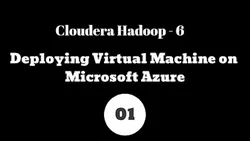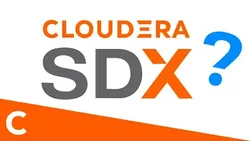
Cloudera Hadoop 600 
This Cloudera Hadoop 600 course provides an introduction to Hadoop and its components. It covers the provisioning of a virtual machine in Microsoft Azure, configuring a local repository for Cloudera Manager and CDH, deploying a virtual machine on Azure, installing Cloudera Manager Server, and configuring prerequisites such as creating a user. This course is ideal for those looking to gain a comprehensive understanding of Hadoop and its related skills. ▼
ADVERTISEMENT
Course Feature
![]() Cost:
Cost:
Free
![]() Provider:
Provider:
Youtube
![]() Certificate:
Certificate:
Paid Certification
![]() Language:
Language:
English
![]() Start Date:
Start Date:
On-Demand
Course Overview
❗The content presented here is sourced directly from Youtube platform. For comprehensive course details, including enrollment information, simply click on the 'Go to class' link on our website.
Updated in [May 25th, 2023]
This course, Cloudera Hadoop 600, provides an overview of how to provision a virtual machine in Microsoft Azure and configure a local repository for Cloudera Manager and CDH. Participants will learn how to deploy a virtual machine on Azure, install the Cloudera Manager server, and configure prerequisites such as creating a user. By the end of the course, participants will have a better understanding of how to use Cloudera Hadoop-6 in Microsoft Azure.
[Applications]
After completing this course, students can apply their knowledge to configure and deploy Cloudera Hadoop-6 on Microsoft Azure. They can also use the skills they have acquired to create a local repository for Cloudera Manager and CDH, deploy virtual machines on Azure, install Cloudera Manager Server, and configure prerequisites such as creating users. Additionally, they can use the knowledge they have gained to troubleshoot and maintain Cloudera Hadoop-6 on Microsoft Azure.
[Career Paths]
1. Data Scientist: Data Scientists are responsible for analyzing large datasets to uncover trends and insights. They use a variety of tools and techniques, such as machine learning, natural language processing, and predictive analytics, to uncover patterns and draw conclusions. Data Scientists are in high demand, as organizations increasingly rely on data-driven decisions.
2. Big Data Engineer: Big Data Engineers are responsible for designing, developing, and maintaining large-scale data processing systems. They use a variety of technologies, such as Hadoop, Spark, and NoSQL databases, to build and manage data pipelines. Big Data Engineers are in high demand, as organizations increasingly rely on data-driven decisions.
3. Data Analyst: Data Analysts are responsible for analyzing large datasets to uncover trends and insights. They use a variety of tools and techniques, such as SQL, Excel, and Tableau, to uncover patterns and draw conclusions. Data Analysts are in high demand, as organizations increasingly rely on data-driven decisions.
4. Cloud Architect: Cloud Architects are responsible for designing, developing, and maintaining cloud-based systems. They use a variety of technologies, such as Azure, AWS, and Google Cloud Platform, to build and manage cloud-based solutions. Cloud Architects are in high demand, as organizations increasingly rely on cloud-based solutions.
[Education Paths]
1. Bachelor's Degree in Computer Science: A Bachelor's Degree in Computer Science provides students with a comprehensive understanding of computer systems, programming languages, and software engineering. This degree path is ideal for those interested in developing and managing computer systems, networks, and applications. Additionally, this degree path provides students with the skills necessary to design, develop, and maintain software applications. As technology continues to evolve, the demand for computer science professionals is expected to increase.
2. Master's Degree in Data Science: A Master's Degree in Data Science provides students with the skills necessary to analyze and interpret large datasets. This degree path is ideal for those interested in working with data-driven technologies such as machine learning, artificial intelligence, and predictive analytics. Additionally, this degree path provides students with the skills necessary to develop and implement data-driven solutions. As data-driven technologies continue to evolve, the demand for data science professionals is expected to increase.
3. Master's Degree in Business Analytics: A Master's Degree in Business Analytics provides students with the skills necessary to analyze and interpret business data. This degree path is ideal for those interested in working with business intelligence, data mining, and predictive analytics. Additionally, this degree path provides students with the skills necessary to develop and implement data-driven solutions. As businesses continue to rely on data-driven decisions, the demand for business analytics professionals is expected to increase.
4. Doctorate Degree in Artificial Intelligence: A Doctorate Degree in Artificial Intelligence provides students with the skills necessary to develop and implement AI-driven solutions. This degree path is ideal for those interested in working with machine learning, natural language processing, and robotics. Additionally, this degree path provides students with the skills necessary to design, develop, and maintain AI-driven systems. As AI-driven technologies continue to evolve, the demand for AI professionals is expected to increase.
Course Provider

Provider Youtube's Stats at AZClass
Discussion and Reviews
0.0 (Based on 0 reviews)
Explore Similar Online Courses

Excel Skills for Business: Essentials

Beginner Character Illustration: Full Process of Adding Color and Texture to Your Work in Procreate

Python for Informatics: Exploring Information

Social Network Analysis

Introduction to Systematic Review and Meta-Analysis

The Analytics Edge

DCO042 - Python For Informatics

Causal Diagrams: Draw Your Assumptions Before Your Conclusions

Whole genome sequencing of bacterial genomes - tools and applications

Cloudera Hadoop Administration

Administration - Hadoop - Cloudera Hadoop on AWS


Start your review of Cloudera Hadoop 600